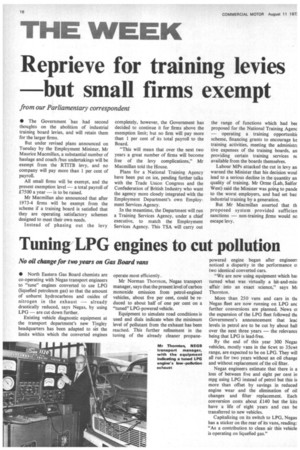Tuning-LPG engines to cut pollution
Page 18

If you've noticed an error in this article please click here to report it so we can fix it.
No oil change for two years on Gas Board vans
• North Eastern Gas Board chemists are co-operating with Negas transport engineers to "tune" engines converted to use LPG (liquefied petroleum gas) so that the amount of unburnt hydrocarbons and oxides of nitrogen in the exhaust -already drastically reduced, says Negas, by using LPG — are cut down further.
Existing vehicle diagnostic equipment at the transport department's new Tingley headquarters has been adapted to set the limits within which the converted engines operate most efficiently.
Mr Norman Thornton, Negas transport manager, says that the present level of carbon monoxide emission from petrol-engined vehicles, about five per cent, could be reduced to about half of one per cent on a "tuned" LPG-powered vehicle.
Equipment to simulate road conditions is used and dials indicate when the minimum level of pollutant from the exhaust has been reached. This further refinement in the tuning of the already cleaner propane powered engine began after engineer: noticed a disparity in the performance at two identical converted cars.
"We are now using equipment which hat turned what was virtually a hit-and-mis: affair into an exact science," says Mi Thornton.
More than 250 vans and cars in the Negas fleet are now running on LPG anc further conversions are planned. News oi the expansion of the LPG fleet followed th( Government's announcement that leac levels in petrol are to be cut by about hall over the next three years — the relevance being that LPG is lead-free.
By the end of this year 300 Negas vehicles, mostly vans in the 6cvvt to 35cw1 range, are expected to be on LPG. They will all run for two years without an oil change and without replacement of the oil filter.
Negas engineers estimate that there is a loss of between five and eight per cent in mpg using LPG instead of petrol but this is more than offset by savings in reduced engine wear and the elimination of oil changes and filter replacement. Each conversion costs about £140 but the kits have a life of eight years and can be transferred to new vehicles.
Capitalizing on its switch to LPG, Negas has a sticker on the rear of its vans, reading: "As a contribution to clean air this vehicle is operating on liquefied gas."




























































































